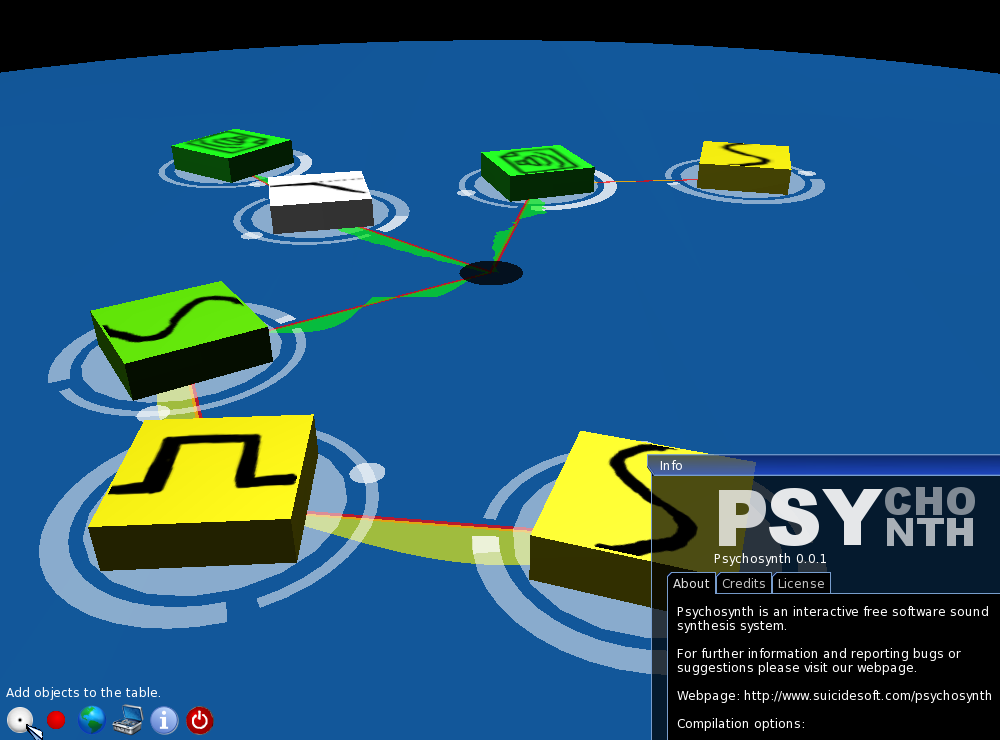The Psychosynth project aims to create an interactive modular soft-synth inspired by the ideas of the Reactable. We will try to provide a clean object oriented API to allow the creation of new innovative interfaces for the synthetizer and a 3D simulator of a Reactable-alike device with support for collaborative music creation over the internet.
Official website: http://psychosynth.com
-
libpsynth: This is a powerful modern C++ library for the building of synthesis software. Type-safe audio buffer and I/O abstractions, inspired by Boost.GIL, a generic system modular synthesis engine, classes for the synchronization of synths over the network using OSC, a framework for easy application creation, among other stug....
-
psynth3d: An interactive synth with an look similar to the Reactable's and a 3D interface which makes use of all the power of libpsynth.
-
psynth: A command line version of the synth that can be used as OSC server or client with low resource usage.
To try the software you will need these third party libraries and programs:
- GNU Autotools (only for the development version)
- Ogre (needed by the 3D interface)
- CEGUI (needed by the 3D interface)
- OIS (needed by the 3D interface)
- liblo (needed for the network support)
- libxml2 (needed for XML config support)
- Alsa (needed for ALSA sound output)
- Jack (needed for Jack sound ouput)
- libsndfile (needed for pcm file support)
- libvorbis (needed for OGG vorbis file support)
- SoundTouch (needed for sample stretching)
- Boost
In Debian and Ubuntu you can install all those dependencies with the
following command. Anyways, I suggest installing liblo from the
original sources because the version in the repositories is outdated
and contains a bug:
sudo apt install cmake libogre-1.9-dev libois-dev \
libcegui-mk2-dev libasound2-dev libjack-dev \
liblo-dev libsndfile-dev libxml2-dev \
libsoundtouch-dev libvorbis-dev libboost-dev
This project uses the CMake build system generator. To compile from sources, do:
mkdir build && cd build
cmake .. -DCMAKE_BUILD_TYPE=Release
cmake --build .
You can then install the software by doing
sudo cmake --build . -t install
You may customize the installation folder by passing
-DCMAKE_INSTALL_PREFIX=<destination-folder> to the cmake ..
command. There are other settings you can pass with
-D<setting>=value, you may list all of them with cmake .. -LH.
Also, there are other things you can do besides building or
installing, see cmake --build -t help to list all possible targets.
Copyright (C) 2007-2015 Juan Pedro Bolívar Puente
This program is free software: you can redistribute it and/or modify it under the terms of the GNU General Public License as published by the Free Software Foundation, either version 3 of the License, or (at your option) any later version.
This program is distributed in the hope that it will be useful, but WITHOUT ANY WARRANTY; without even the implied warranty of MERCHANTABILITY or FITNESS FOR A PARTICULAR PURPOSE. See the GNU General Public License for more details.
You should have received a copy of the GNU General Public License along with this program. If not, see http://www.gnu.org/licenses/.


